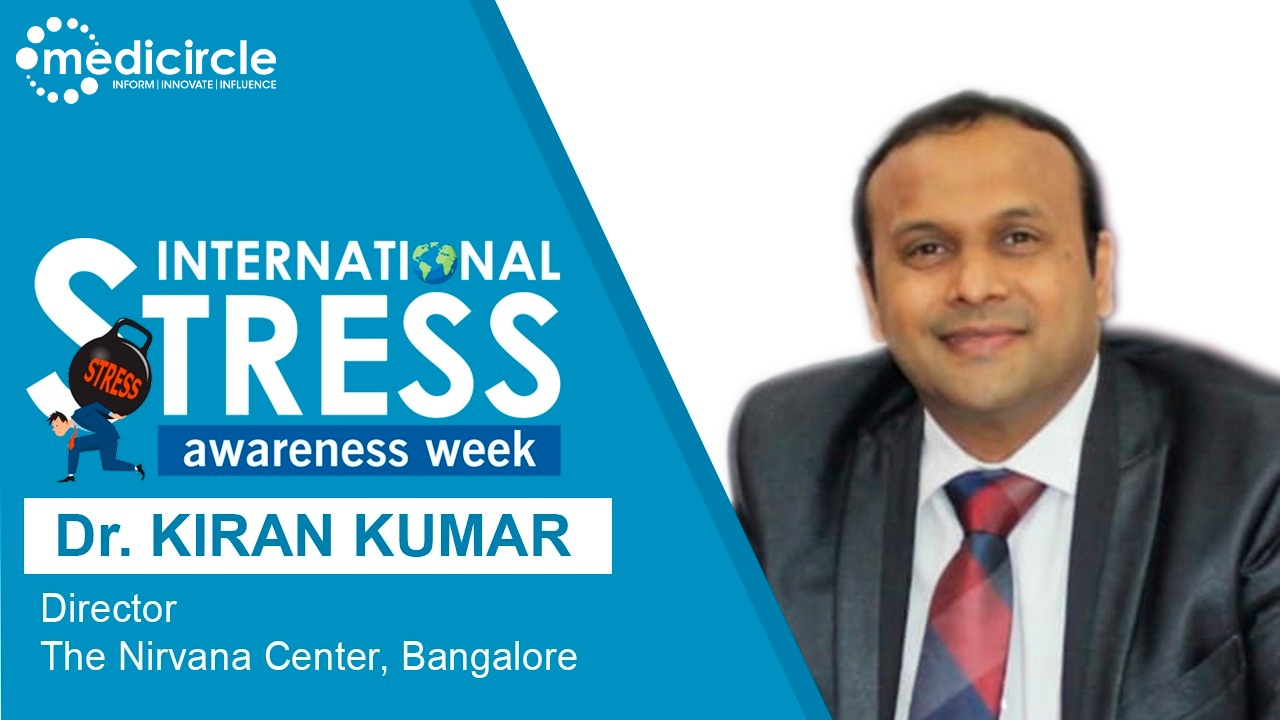The feeling of being overwhelmed or unable to cope with mental and emotional pressure is stress. Stress is our body’s response to pressure. Many different situations or life events can cause stress. Sometimes, this stress response can be useful: it can help us push through fear or pain. However, too much stress can cause negative effects. Long term, this can affect our physical and mental health.
As per the result of a large-scale survey conducted across India in 2019, young adults between the age of 20 and 29 years of both genders were the most stressed in the country. The major cause of high-level stress among young people are peer pressure, pressure to succeed in academics or work and irregular routines. 50% of Indian professionals have reported that an uncertain future is their topmost source of stress as was revealed in a recently concluded survey by The7thFold, a boutique HR and Wellbeing firm.
Every year, the world celebrates International Stress Awareness Week from 1st to 5th November. The day encourages people to sit back, unwind and embrace peace. Awareness about this become even more significant this year due to the tough times people across the world have gone through in the COVID-19 outbreak.
We at Medicircle are conducting International Stress Awareness week Series wherein we will be featuring experts in this field to understand and create more awareness about the effects of stress.
Dr. Kiran Kumar is a Director at The Nirvana Center, Bangalore. He is also a professor of Psychiatry at Vydehi Institute of Medical Sciences and Research Center, Bangalore. He is a founding member of “Minds United Trust for Humanity and Health Sciences”. He is an Editor of a book titled “Glimpses of Psychiatry for Medical Students and Practitioners.” He is associated with the Indian Psychiatric Society and the Indian Association of Private Psychiatry as a Life Member and Hon. Secretary respectively.
What is Stress?
Dr. Kumar begins, “Stress is body’s alarm or stimulus to a certain stimulus. This reaction causes an array of changes in the mind and then in the body.”
Are children more prone to stress than adults?
Dr. Kumar explains, “We often perceive children as carefree and free-spirited. As kids don’t have to worry about paying bills or have any other stress. This is a myth. Stress is very common in children. On the contrary, some surveys claim that children and adolescents go through more stress than adults.”
“A child can feel stress even before he/she is born. Because of changes in the maternal system, an unborn child can feel stress. Thereafter, factors like isolation, poverty, academics, war, disasters affect the child. Even disputes between parents and substance use amongst them can cause stress to the child.”
“A stressful child will develop into a stressful adult. Growing up stressed can cause many anatomical malformations in the brain. So yes, stress is more in children than adults.”
Can stress affect the body?
Dr. Kumar replies, “Stress is a chemical response, like cortisol. This created a metabolism reaction. Many lose their sleep or experience other disturbances. With stress, there is no single cause and effect phenomenon. There are many changes that are occurring in the body.”
“The same cause for many diseases like infertility in women, diabetes, hypertension, stroke, dementia and even psychological disorders like anxiety and depression is stress. In children, one can observe reduced concentration and attention due to stress. This highlights that stress is no longer a thinking and mental condition only. It can affect the body.”
“Here we are mainly talking about chronic stress. This is toxic in nature. On the other hand, there is acute stress, which happens right before an exam. Acute stress is in a way positive stress or eustress as it pushes you to study. It is chronic stress that is toxic and can cause many metabolic changes in your body.”
Advice for parents with stressed children
Dr Kumar advises, “Parents/Adults/Caretaker should acknowledge that the child is going through stress. Break the myth that children are carefree always. Look for certain red flags like sudden behavior change like being cranky, clingy, not eating, low academic performance, nightmares or sucking thumb.”
“Once you notice these changes you must communicate with the child. Help the child develop a positive attitude, rational thinking and empathy.”
How to deal with stress?
Dr. Kumar mentions, “Everything and anything can cause stress. The way one can manage stress is by ABC. A for awareness. Meaning one should be aware of and acknowledge stress. B for balance. Have a balance between positive and negative stress. And C is for control. One can control stress with a positive coping mechanism.”
L - Laughing
E - Exercising
A - Attitude (positive)
R - Rest
N - Nutrition
(Edited by Priyal Shah)

 Stress is body’s alarm or stimulus to a certain stimulus. Know how to respond and react to deal with stress for both adults and children.
Stress is body’s alarm or stimulus to a certain stimulus. Know how to respond and react to deal with stress for both adults and children. 



















.jpeg)










